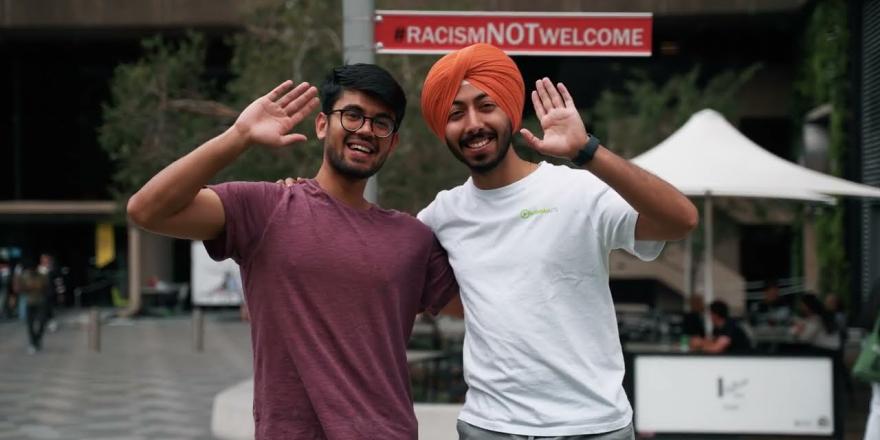Diversity and excellence go hand-in-hand.
UTS values and honours diversity
UTS is a culturally diverse university. Half of our students were born outside Australia, and half also have a language background other than English. One per cent of our students are Aboriginal or Torres Strait Islander.
We honour the value of diversity in all its forms. We promote a respectful and harmonious culture, where every member of our community is not only free from discrimination, but feels welcomed, included and accepted as their whole person.
But we also recognise that we exist in an unequal world, where structural and systemic biases and barriers still impact individuals and influence our social infrastructure. We are committed to proactively addressing inequalities in our own community through:
Policies and programs
- The UTS Equity, Inclusion and Respect Policy.
- Clear communication and promotion of values and behaviours expected of our staff and students.
- A variety of training – e.g. cultural awareness, Indigenous cultural awareness.
Celebrating and supporting cultural diversity
- The University offers leave for staff to participate in cultural and religious days of observance. (See the Enterprise Agreement under ‘Personal Leave’).
- The UTS Multicultural Women's Network aims to enable multicultural women to realise their full potential and experience equity and justice at UTS. The network welcomes UTS professionals, students and academics, continuing/tenured, fixed-term and sessional/casual staff members and HDR students who identify as women and who have been minoritised based on their cultural, ethnic or linguistic background. Join the MWN network.
Access, retention and success
- Equitable recruitment policies.
- Equitable admission processes and outreach programs, including the UTS Humanitarian Access Program, Pasifika mentoring, and other initiatives that target diverse student cohorts.
- Including considerations of intersectionality as a key part of our Athena SWAN gender equity program at UTS.
- Inclusive teaching, learning and professional development.
Elimination of discrimination and harassment
- Equity-related advice and complaints management for both staff and students
- Support services for staff and students
UTS recognises the value of Aboriginal and Torres Strait Islander knowledges and perspectives. The UTS Reconciliation Statement reasserts an ongoing commitment by the university to provide educational opportunities in the higher education sector for Indigenous people and, through research and education, the restoration of their histories and knowledge systems.

Friends, we’re making
a strong institutional commitment today.
Today, as a community, we're proud
to unveil the #racismNOTwelcome signs.
Two of the iconic red
signs in the busiest area on a public campus
to validate the experiences of racism,
to drive conversations,
and to empower our community
to be actively anti-racist.
We have a responsibility as a university
to advocate
for all aspects of social justice,
equity and inclusion,
and on the day for the elimination
of racial discrimination
this focus takes the form of acknowledging
and being honest
about our part in eliminating
and sometimes enabling racism.
But I think it's also important
to think about the times
when we haven't engaged in anti-racism
and to think about, okay, well,
what projects have we sidelined
because we think that
maybe they're too difficult
or we think that they're not relevant?
I know UTS has done a lot of work
over the years to commit to diversity
awareness and anti-racism,
so I guess I'd really like to see
it really embedded into subjects
and curriculum.
You've got to be really deliberate
about learning more about things
and taking action on those yourself.
So it's not just about knowing in theory.
It's about thinking
What practically can I do?
Now we are here to witness
the installation of the signs.
We are the first university to do so.
These signs
point us in the right direction.
They orient us towards
being actively anti-racist.
The signs are not just signs
that state our intent.
They are signs that also reassure people
that they're welcome here,
that they are welcome here.
Wherever you come from, whatever
your view, whatever your background,
whatever you look like,
this is a community for you.
I'm a Yuwaalaraay man
from north west New South Wales,
and it is my privilege to live
and work on Gadigal country.
And so on days like these, with the signs
and other things we are,
we do end up asking ourselves
what we can do
to actively combat this.
From a structural
and institutional point of view,
it's really important
to think about how the policies we have
in place and systems
we have in place at the university impact
on likelihood of racism occurring
and affecting the university students
and staff here at UTS.
I would love to get a part of more
anti-racist endeavors like this
if there is more avenues and spaces
where we can sort of impact anti-racist
endeavors,
I would love to be a part of that.
A place where we have zero
tolerance racism,
whether overt or subtle, done
knowingly or unknowingly,
racism, along with all forms of racial
discrimination, is not welcome
and accepted at UTS.
Everyone has their own
kind of sphere of influence,
and so I think it's about thinking
about the work that you do
and whether it brings, you know, is it
a safe space for people to engage with?
Is it a safe place
for Black and Indigenous people.
We’re part of the university community
here at UTS
and we’re part of a campus community,
but then we also bring communities
in from outside the university
looking outwards as well,
thinking about how UTS as a university
influences and affecting change
in the broader society as well.
It is not a sad day.
This is a day
where we need to be positive.
We need to work together
and be together as a community.
This is the day for the elimination
of racial discrimination.
But let's make this a lifetime.

